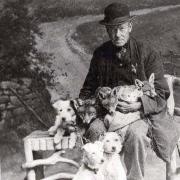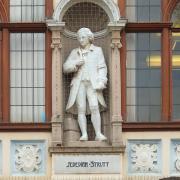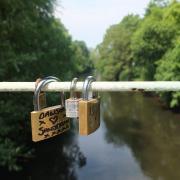Martin Clunes makes a welcome television appearance this Bank Holiday in a comedy drama entitled The Man Who Lost His Head.
Martin Clunes makes a welcome television appearance this Bank Holiday in a comedy drama entitled The Man Who Lost His Head. Clunes plays a museum curator who has been sent to negotiate with a Maori community that has demanded the return of a sacred carved head from the British Imperial Museum.
Although the government has urged the museum to be sympathetic to the claim, the curator is determined to find bureaucratic reasons to reject the repatriation of the carving. However, when he arrives in the small village of Otakatoka, he is totally seduced by his new surroundings and soon finds himself falling for a Maori woman called Lollie. Meanwhile, his fianc� back in the UK is drawing up seating plans for her forthcoming wedding to the curator, whose long-awaited promotion hinges on the success of his mission to the other side of the world.
Described by Martin Clunes as a 'fascinating and fun story', the film has been scripted by Derbyshire-based writer Mark Wallington, who was also responsible for the recent television adaptation of Gil McNeil's novel The Only Boy For Me. As well as producing scripts for radio and television, Mark writes the sort of books that should not be read in public places by anyone who is likely to be embarrassed when they break into uncontrolled laughter in the presence of strangers. When I visited Mark at his home in Edale and asked him to retrace the steps that led to his becoming a leading comedy writer, he recalled two pieces of careers advice that he received from his parents. During his childhood in Swanage, he developed a stammer, which prompted his father to warn him: 'Don't get any ideas of becoming a newsreader when you grow up.' At the age of eighteen, when he returned home with just one A-level in English to show from his years as a boarder at Mount St Mary's College in Derbyshire, his disappointed parents urged him to add to his qualifications in order to prepare for a career in business.
However, Mark had other ambitions in mind by this time. Having finally taken up reading for pleasure, he decided that he wanted to write comedy like Spike Milligan, compose poetry like W.B.Yeats and travel like Laurie Lee. Before agreeing to take up a place on the business course that his parents had secured for him, he satisfied his desire to travel by embarking on a long trip that took in Italy and the Greek Islands. Once he had completed his studies, wanderlust set in again and won out over thoughts of a business career. Ignoring his parents' vocational advice, he returned to Italy, where he earned money by busking with his guitar and working as a labourer. During a stop-off in Perugia, he had a life-changing encounter with Dick Fiddy, a fellow Milligan fan.
After managing to come up with a few comedy sketches of their own, Mark and Dick decided that they were going to become scriptwriters who would 'change the face of British comedy'. However, their grand ambition was put on hold while they each went off on their separate travels - Dick to Canada and Mark to America, where he worked as a bicycle messenger in San Francisco and wrote a batch of poetic songs which he was convinced would turn him into the next pop sensation. On his return to England, Mark was dismayed to find that no one was interested in songs about worthy topics such as saving the whale because Punk had suddenly become all the rage.
However, he and Dick met up again and renewed their comedy ambitions. As well as spending long nights writing unsolicited scripts with Dick in the back room of a pub, Mark earned a living as a jobbing gardener by day. His hopes of acceptance as a scriptwriter were raised when he was invited to meet Dave Allen, only to be dashed when the comedian asked him just one question: 'At what time of year should I plant my Leylandii?' Mark and Dick had their first real taste of success in 1980, when two sketches were accepted for Not the Nine o'clock News. Shortly afterwards, their comedy series about a seaside pier in winter was accepted as a pilot. Unfortunately, it was never shown as a series. Seeking solace after this disappointment, Mark decided to borrow a dog from a friend and set off with his canine companion on the South West Coastal Path.
On his return, he had an article about his experiences published in the London Evening Standard. Encouraged by this success, he decided to convert the diaries he had kept on his travels into a book entitled 500 Mile Walkies. With its description of the author as an inexperienced hiker who is daunted by the prospect of a journey that is 'the length of 100,000 doubledecker buses' and its portrait of Boogie as a dog that can't negotiate stiles, won't fetch sticks and has difficult encounters with cows, the book became a bestseller and launched Mark on a new career as a humorous travel writer.
The account of his coastal adventure was followed by three further hilarious travelogues: Destination Lapland, the story of an intended cycle-trek to the Far North that got no further than Newcastle; Boogie up the River, which chronicles Mark and Boogie's journey by slow boat to find the source of the Thames; and Pennine Walkies, which describes a trek up the backbone of England in the company of an animal that prefers a room with satellite television and a sofa to the great outdoors.
By this time, Mark was getting lots of freelance work as a travel writer. On an assignment to Turkey for the Sunday Times, he met a couple who subsequently invited him for dinner in London, where he met their daughter Catherine. Mark and Catherine, who are now married and have two sons, have been together for 20 years. In 1994, they moved to Derbyshire, a county which Mark knew from his schooldays. During their years in Edale, Catherine has been employed as a social worker in the Derbyshire Dales and Mark has not only written further books, but has also resumed his television scriptwriting career, working now as a lone writer. Station Jim, a family entertainment that is set in Victorian times and involves trains and dogs, was shown on BBC television in 2002 and repeated in 2004.
His own adaptations of two of his novels have also found their way onto the small screen. The Missing Postman was shown as a two-part television play, with James Bolam in the starring role, and won the Best BBC Comedy Drama at the British Comedy Awards in 1997. Happy Birthday Shakespeare, which was also screened in two episodes, starred Neil Morrissey, who played a bus driver with a yearning to exchange his existence in a dustmite-ridden flat in North London for life in the chocolate-box England he encounters during his work for Beefeater Tours. Mark's most recent book is The Day Job, a characteristically hilarious account of those early days when he eked out a living as a jobbing gardener in North London while he tried to make his mark as a scriptwriter.
Although Mark has come a long way since that time and gained acceptance as one of the country's best comedy writers, he has not lost his head over his success. In fact, he talks about his present life as if he were still avoiding that steady job in the business world. He says: 'I've never really had a job or known where my next income would come from, but I've been lucky enough to have an outlet for my ideas and I've also had the bonus of spending a lot of time at home with my two sons.'


























